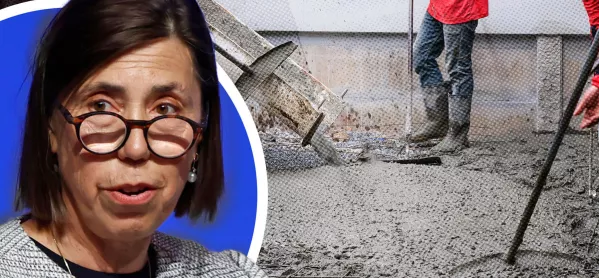Academies minister Baroness Barran has said some local authority schools were left “on their own” to deal with problems caused by reinforced autoclaved aerated concrete (RAAC).
Support from local authorities for affected schools was “very variable”, the minister said at the Confederation of School Trusts’ (CST) trust finance conference this morning.
“There were some fantastic local authorities, but some of the schools were just on their own with a headteacher taking all the pressure. It felt very unfair on them and unsafe for the system,” Lady Barran said.
She added that RAAC-affected schools in strong academy trusts were able to get support from their trusts and use other spaces within their school network if needed.
So far 231 schools have been confirmed to have RAAC present. Responsible bodies - trusts or local authorities - were responsible for filling in a questionnaire about whether or not their school buildings were suspected of containing the potentially dangerous concrete.
Several schools have been affected so severely they have had to use alternative spaces for learning, such as temporary classrooms or off-site locations.
Converting good schools into trusts
Lady Barran made her comments in conversation with CST chief executive Leora Cruddas, who said she was “a bit worried about resilience in our school system”.
“I think ensuring we have got a strong pipeline of good converter schools into trusts is important,” Ms Cruddas said. “It is important that those schools come into the trust system because they bring capacity and create that strength and resilience.
“But also because if they are left on their own, I am a bit worried about whether they will remain good schools.”
She added that she thinks a conversation needs to be had about speeding up the conversion of good schools into trusts.
The minister said her concern was that most of the academy conversion was from “one relatively cosy place to another”, rather than where it was needed to create capacity.
“We are worried about the support that particularly some primary schools are getting, or not getting, from local authorities,” she added.
Is full academisation still the goal?
The CST previously said it was concerned about the Department for Education’s “change in tone” on academisation. Education secretary Gillian Keegan had said there would be no “push or pause” on academisation, speaking in a broadcast to the sector.
A CST briefing to members after the briefing stated: “Asked whether all schools will be expected to join a trust, or whether the policy ambition has been paused, the secretary of state said ‘neither’; she did talk about the benefits of synergy and collaboration that the trust sector provides.
“However, we are concerned about what appears to be a change in tone by the department and will be seeking urgent clarification on exactly what this means in policy terms between now and the election.”




